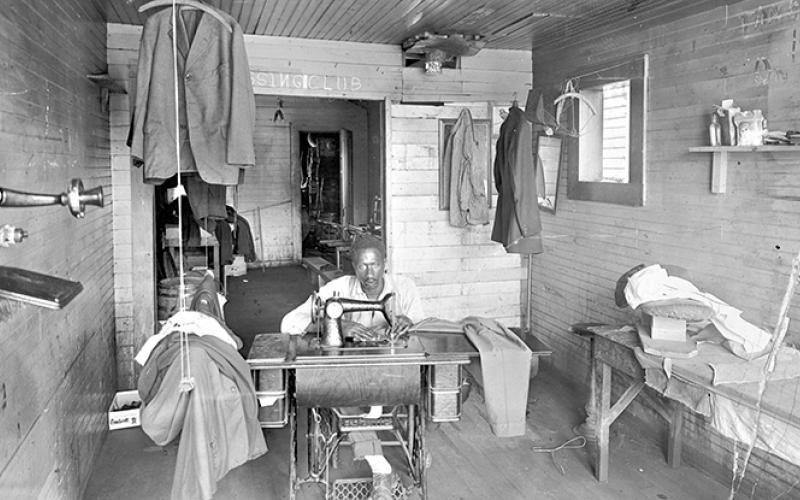Andrews - More than 100 years ago, William Cleveland Miller found peaceful white people in the Valley and built the first house in what was soon to be called Happytop. This weekend, his granddaughter, Ann Miller Woodford, shared his story and the stories of others in the black community to a church filled with mostly white women.
Woodford’s goal during the Racial Justice workshop at Andrews United Methodist Church on Saturday was to bring people together by sharing and talking. Woodford is a local historian, author, artist and activist.
Her grandfather, known as Cleve Miller, was living in Forsyth County, Ga., in 1912 when a black man allegedly raped and killed a white woman. Three young black men were lynched, and white mobs forced out the remainder of the black residents, with no time to pack their belongings. Woodford shared the story of one family that as they were preparing to eat, whites chased them out of their house, then sat down and ate their meal.
Miller and his mother moved to Marietta, Ga., then to Blue Ridge, Ga. During his travels working for the railroad, he learned that the white people of Andrews and Murphy were different – they were not blatantly racist. So he purchased land in the Andrews area and built a house by 1914.
He told other family members and friends about the community, and eventually they purchased lands and built homes near Miller’s. His cousin often held parties serving white lightning and barbecue, causing William Bowens – owner of The Pressing Club, the only black-owned business in Andrews – to name the community Happytop. Most of the men worked in the tannery owned by Cover family.
Woodford shared that education was always important in the black community. She attended Andrews Colored/Negro School, which stood across the road from where Mount Zion Missionary Baptist Church is today.
Her favorite teacher was Ida Mae Logan, who encouraged her and sent her art to contests. She said Logan was always continuing her education so she could provide more to her students.
When the schools were integrated, the community thought they would get to keep the campus, as it also served as a gathering place. Instead, the school board sold Andrews Colored/Negro School to a white man, who promptly tore down the building.
One woman in the audience, Sheila Robinson, was in seventh grade when the schools were integrated. Woodford asked her to share her experiences of transitioning from that school to Andrews Middle School.
“It was difficult,” she said. “There were some people who were nice… There was one guy in seventh grade who was just awful to me.”
She said she ended up having to prove herself – that she could be just as smart as everyone else, even though she had come from a one-room school.
“I knew I was somebody,” Robinson said. “I worked really hard.”
Robinson said she ended up being the first black student to graduate with honors from Andrews High School.
Woodford said some people were not as uplifting as others. She asked everyone in the room to strive to do better by finding something about an individual child they can boost.
She told everyone they can ask her anything, as long as it’s done in a respectful manner.
One thing that often upsets people today is the topic of white privilege. Woodford explained that it doesn’t mean a white person hasn’t personally struggled, it just means there’s black oppression.
“White people can go anywhere in the world and be accepted,” she added. “You have some power, you can speak up. … We can all do something to make this a better country.”
Beth Duncan, one of Woodford’s longtime friends, helped organize the workshop for United Methodist Women. She saw Woodford speak at another event and wanted to provide her an opportunity to present a full workshop.
She thought it was important and still very relevant for Woodford to share the stories and images, even ones that may been difficult to see and hear.
“The biggest thing is so history is not repeated,” Duncan said. “If we don’t face history, we’re going to be where we’re in danger of repeating it. … I think Ann’s history is our history.”
Lloyd becomes a Blue Angel
Pensacola, Fla. – Logistics Specialist 2nd Class Gregory Lloyd of Murphy earned his Blue Angels Crest last week after several months of training.
Lloyd is the son of Greg Lloyd and Brenda Darlene Allen. He graduated from Murphy High School in 2010 and joined the U.S. Navy on Jan. 28, 2013.
During his seven years in the Navy, he has been deployed four times across Asia. He has received four Navy Achievement Medals and two Flag Letters of Commendation.
Lloyd was one of two selected from the Navy in June 2019 for his position on the U.S. Navy Blue Angels team. He serves on the team’s supply department, which researches, procures and dispatches spare parts, tools and uniforms, according to information from the U.S. Navy Blue Angels. Enlisted personnel volunteer for a three-year tour with the squadron.
The Blue Angels’ mission is to showcase the pride and professionalism of the Navy and Marine Corps through flight demonstrations and community outreach. Lloyd thanks Joanne Davis, Lynn Deweese and Caesar Campana for believing in him.
Samantha Sinclair is the Scouting Around columnist for the Cherokee Scout. You can reach her by phone, 837-5122, Ext. 24; or email, scoutingaround@cherokee-scout.com.

